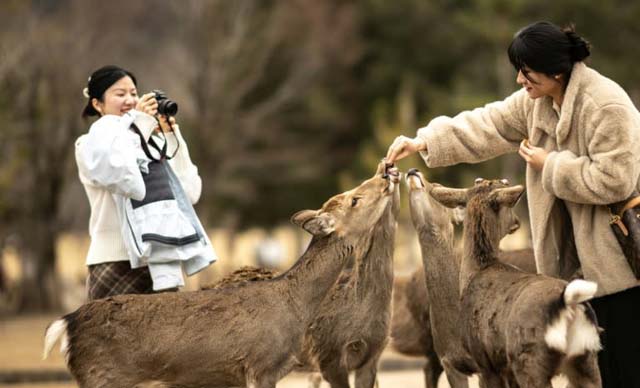News Flash
News Flash

NARA, Japan, Feb 12, 2025 (BSS/AFP) - As peckish deer chase delighted tourists in Japan's temple-dotted Nara Park, a quiet but dedicated team of litter-pickers patrols the stone paths, collecting plastic waste that threatens the animals' health.
The ancient city of Nara is a major draw for the country's record influx of visitors -- but like in nearby Kyoto, where photo-hungry crowds have been accused of pestering the famous geisha, there have been unwelcome consequences.
Tourists are only allowed to feed the deer special rice crackers sold in Nara, but the animals are increasingly eating rubbish by accident.
"More and more people are tossing away their leftovers or snack packaging in the park," Nobuyuki Yamazaki of the Nara Deer Preservation Foundation told AFP.
"Plastic items can accumulate in deer stomachs over a long period, leading to their death through weakness," he warned.
Some activists have even retrieved chunks of plastic waste from Nara deer carcasses.
Armed with gloves, tongs and dustpans, the park's litter-picking squad -- called Beautiful Deer -- are fighting back.
The team, which mostly employs people with disabilities, has been collaborating with Yamazaki's foundation for several years.
Around half a dozen Beautiful Deer staff patrol the park in bright green jackets, unfazed by the excited squeals of holidaymakers surrounded by their hooved friends.
For many members, "the idea they're contributing to society is at the core of their motivation", said the squad's supervisor Masahito Kawanishi.
- No bins -
Around 1,300 wild deer roam the vast park, which has been their home since the eighth century, as the legend goes, acting as divine envoys for a Shinto shrine.
Drawn partly by the weak yen, 36.8 million foreign visitors came to Japan last year, a new record that the government wants to almost double to 60 million annually by 2030.
But residents and authorities in tourist hotspots, from tradition-steeped Kyoto to towns near the majestic Mount Fuji, are increasingly voicing frustration about overcrowding, traffic violations and bad behaviour by some visitors.
Nara Park is no exception -- especially when it comes to litter.
The park has no public bins -- a policy introduced about four decades ago to stop deer scavenging in them for food.
Visitors are instead encouraged to take their trash home -- an ingrained habit in Japan that is not always shared by people from abroad, Yamazaki said.
"It's perhaps difficult to expect the park to remain empty of trash cans forever," he said.
With cultural differences in mind, Nara authorities are trialling high-tech, solar-powered bins near the park in a 20-million-yen ($129,000) project.
The bins can automatically compress trash and bear the slogan: "Save the Nara deer from plastic waste".
Public bins are scarce across Japan, with one theory being that the deadly 1995 subway sarin gas attacks by a doomsday cult caused them to be removed.
Gawel Golecki, a 40-year-old from Poland who regularly visits Japan, told AFP he now keeps his trash with him.
"It's kind of strange for us," he told AFP. "(In Europe) there is always a place to throw" it.
French tourist Arnaud Bielecki, 56, said it's "a shame that the deer eat plastic dropped by visitors", adding that the Beautiful Deer squad should be supported.
"I'm glad there's a programme like this," he said.